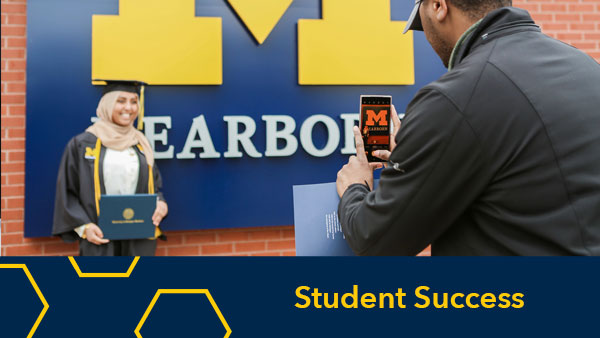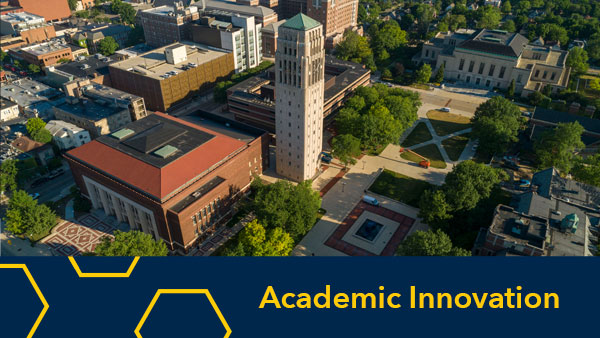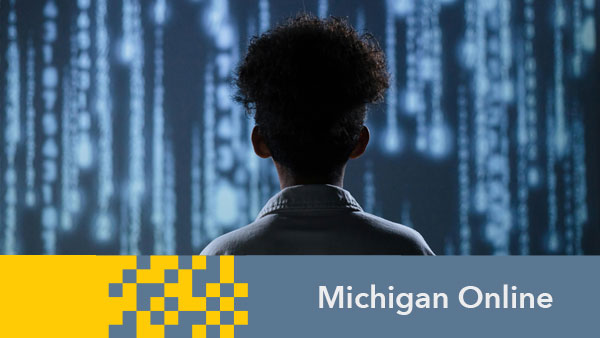James DeVaney, Associate Vice Provost for Academic Innovation
@devaneygoblue
In September 2016, President Schlissel kicked off a new Academic Innovation Initiative and called for the next stage in the evolution of the University of Michigan’s leadership in higher education. At a series of opening events in the Fall, our community gathered in a range of settings to articulate the many ways in which academic innovation is critical in the pursuit of knowledge, inclusion, and impact. Academic innovation is where creativity, comprehensive excellence and our aspirations for societal impact all come together at the University of Michigan. As we imagine again how the world learns from and with a great public research university, there are many design questions to consider. For example:
- How can we leverage networked access to information, new modes of learning and the power of data analytics to strengthen the quality of a Michigan education and enhance our impact on society?
- How might we unbundle the curriculum from disciplines and rebundle around problems, events, and phenomena most important to society?
- How should we consider pedagogical, technological, and program model innovation in concert, rather than in isolation from one another, and create a new and sustainable model for academic R&D?
- How should we take what we know about where learning happens – within, outside, and on the periphery of curricula – and adapt our systems and structures to best represent what a learner knows and has experienced?
- How should we think about changes in our ability to effectively reach learners in a lifelong and lifewide capacity in the context of our mission and institutional values?
The President charged our community to look well into the future – to anticipate changes through globalization, technology, and the future of work – and to recommend new and transformational approaches and recommendations for leveraging academic innovation to further realize our mission. At the same time, he pushed us to further invest the talent and energy of our diverse community in adopting an experimental and collaborative mindset. We must learn by doing. We should launch a set of rich and interconnected experiments to explore the future of education at the University of Michigan, on and off campus, in formal and informal environments.
And so we have begun.
Since September, we have launched twenty new projects supported through the Academic Innovation Fund and in partnership with the Office of Academic Innovation. These initiatives and team members are listed below.
- Act On Climate: Steps to individual, community and political action – School of Natural Resources and Environment – This new MOOC encourages and supports social action to address and respond to climate change.
Michaela Zint, School of Natural Resources and Environment, and a team of students from the School of Natural Resources and Environment, College of Literature, Science, and the Arts, Ford School of Public Policy and School of Information.
- Centering (IM)Visible Voices – School of Education – This course highlights the lived experiences of historically marginalized individuals.
Tabbye Chavous, School of Education; Marie Ting, National Center for Institutional Diversity; Laura Sanchez-Parkinson, National Center for Institutional Diversity; Elizabeth James, College of Literature, Science, and the Arts; Shelly Connor, Alumni Association.
- Change agents for climate change: An initiative to transform students from consumers to developers of MOOCs – School of Natural Resources and Environment – This residential opportunity actively engages students in the development of a massive open online course (MOOC) through a seminar designed both to enhance their teaching abilities and to deepen their understanding of climate change.
Michaela Zint, School of Natural Resources and Environment; Rachel Niemer, Office of Academic Innovation; Tazin Daniels, Center for Research on Learning and Teaching.
- Community Organizing for Social Justice in Diverse Democracy – School of Social Work – This MOOC examines strategies of community organizing for social justice in a diverse democratic society.
Barry Checkoway, School of Social Work.
- Governing Sustainability – School of Natural Resources and Environment – This online course examines sustainability governance strategies of real-world decision makers.
Arun Agrawal, School of Natural Resources and Environment.
- Introduction to Interprofessional Education and Practice – School of Social Work and U-M Center for Interprofessional Education – This module provides knowledge and resources for Interprofessional Education in order to improve health for all.
Laura Smith, U-M Flint Physical Therapy; Mary Ruffolo, School of Social Work.
- Leading Change: Go Beyond Gamification with Gameful Learning – This new MOOC gives school leaders and teachers tools to support gameful learning environments that foster personalized and engaged learning.
Barry Fishman, School of Education and School of Information; Rachel Niemer, Office of Academic Innovation.
- Mindware: Critical Thinking for the Information Age – College of Literature, Science, and the Arts – This new MOOC teaches basic concepts of statistics, probability theory, the scientific method, psychology and microeconomics as they relate to everyday decisions and judgments.
Richard E. Nisbett, College of Literature, Science, and the Arts.
- Policymaker – Ford School of Public Policy – This customized, hands-on, role-playing simulation platform allows educators to create and implement interactive learning opportunities for students.
Elisabeth R. Gerber, Ford School of Public Policy.
- Problem Roulette – College of Literature, Science, and the Arts – This web-based practice tool provides students with access to a large library of past exam problems.
August (Gus) Evrard, College of Literature, Science, and the Arts.
- Public Library Management – School of Information – These digital courses provide a pathway for library professionals to expand their toolkit of management strategies.
Kristin Fontichiaro, School of Information; Lionel Robert, School of Information; Larry Neal, Clinton-Macomb Public Library; Josie Parker, Ann Arbor District Library.
- Starting a Social Enterprise – Ross School of Business – This new MOOC guides learners to explore if, when and how to launch a social enterprise.
Michael Gordon, Ross School of Business
- Storytelling for Social Change – School of Music, Theatre & Dance – This new MOOC highlights how theatre can motivate social change and activism.
Anita Gonzalez, School of Music, Theatre & Dance
- Transformational Leadership: Leading for Equity, Diversity, and Inclusion – School of Education – This new MOOC shares new approaches to leadership in higher education in the context of equity, diversity and inclusion.
John Burkhardt, School of Education; Betty Overton, School of Education; Noe Ortega, School of Education; Amy Fulton, School of Education; Rosario Torres, School of Education.
- Using Digital Modules to Holistically Prepare Students for Sustainable Community Engagement – School of Social Work, School of Information, and the University Library – These modules help learners effectively and respectfully engage in, work alongside, and transition from a community-based initiative.
Mary Ruffolo, School of Social Work; Kelly Kowatch, School of Information; Kathleen Lopez, School of Social Work; Carrie Luke, University Library.
- Web Applications for Everybody – School of Information – This series of courses introduces and teaches learners how to build dynamic database-backed websites.
Charles Severance, School of Information.
- Wireless Indoor Location Device (WILD) Learning System – College of Engineering – This system enables a new form of computer-supported collaborative learning where students are actively involved in a simulated world. It will provide a unique platform for kinesthetic learning that will allow students to become active participants in complex systems.
Perry Samson, College of Engineering and School of Information; Mark Moldwin, College of Engineering; Lauro Ojeda, College of Engineering; Stephanie Teasley, School of Information.
- Social Work: Practice, Policy and Research MicroMasters – School of Social Work – This MicroMasters equips learners with a framework to understand social work core theories and practices.
Mary Ruffolo, School of Social Work; Barbara Hiltz, School of Social Work; Katie Richards-Schuster, School of Social Work; Jamie Mitchell, School of Social Work; Brian Perron, School of Social Work.
- User Experience (UX) Research and Design MicroMasters – School of Information – This MicroMasters provides learners with the knowledge and skills to research and design products that users will love.
Mark Newman, School of Information; Clifford Lampe, School of Information; Pedrag Klasnja, School of Information; Lija Hogan, School of Information.
- Leading Educational Innovation and Improvement MicroMasters – School of Education – This MicroMasters provides learners with the knowledge base and core skills to advance educational instruction through educational policy, reform and practice.
Don Peurach, School of Education; Elizabeth Moje, School of Education; Deborah Loewenberg Ball, School of Education; Nell Duke, School of Education; Liz Kolb, School of Education; Gretchen Spreitzer, Ross School of Business.
In addition to these new initiatives, many other initiatives underway prior to September have captured further momentum with the launch of the new Initiative. We invite the campus community to continue to engage in this important activity by sharing an idea, participating in an event, or proposing a new initiative.


